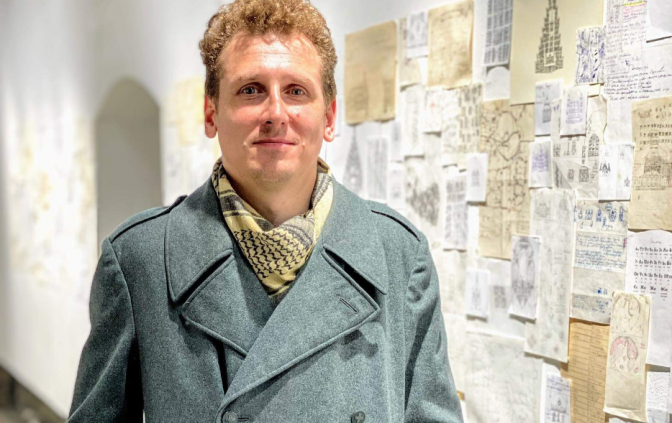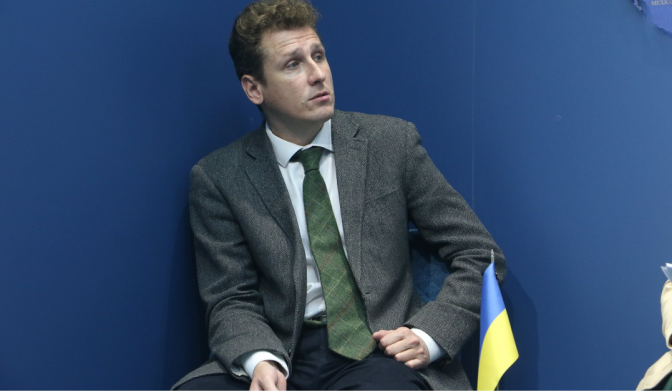
Lviv Now interviewed Ostap Kryvdyk, an activist, political scientist, and associate researcher at the Ukrainian Catholic University Analytical Center to find out if Ukraine is ready for potential provocations, and whether the crisis on the Belarusian-Polish border is part of a Russia’s plan to invade Ukraine. Ostap, an international security expert, has advised Ukraine’s security council, defense secretary, and the speaker of the Rada (parliament). He describes himself as a «professional revolutionary.»
Has Ukraine learned its lessons after the occupation of Donbas and the annexation of Crimea, Ukrainian territory occupied by Russia now for seven years, and is it ready for provocations?
«There are several different levels of readiness. Ukraine is partially ready, given the difficult experience of the war’s beginning in 2014. The government made certain conclusions about security and defense, it changed the legislation. However, only part of the crisis action plans have been prepared. To make a full plan, it is necessary to conduct an inventory of all industries. Given the looted institutions, their leaders are reluctant to do so.
Read also: «Russia took our data.» Lviv developer makes alternative to Russian-apps used by Ukrainian troops
«As for society in general, it is less prepared for a crisis because people are quite relaxed. Ukrainians do not feel that a potential Russian invasion is an existential threat. Something similar happened in 2014 in the Donetsk region, when houses were burning there and people had to flee under fire taking nothing with them.
«Now, the country and Kyiv are living a normal life, as if there is no war in the East and no threat of invasion. It would be worth preparing, as before a big storm or a big fire.
Part of the preparations should be made by the state, part by society. The state doesn’t communicate it correctly, gives people no understanding of the threat, and doesn’t evoke their desire to self-organize. This opens up the opportunity for local government initiatives to work within the new law ‘On the Fundamentals of National Resistance’ and to develop territorial defense.
«It is difficult to comment on the new law, because a more significant part of it is secret. It is good that there are some plans at all, but how effective they will be is a question. The new leadership of the General Staff of the Armed Forces inspires hope for the better. At the same time, some people in the Presidential Administration have compromised themselves through «the Wagner case» (a special operation being prepared by Ukrainian special services aimed at detaining troops of the Russian mercenary battalion «Wagner», including those involved in the downing of an IL-76 in Luhansk and a Boeing 777 near Donetsk). This adds pessimism, so we need to prepare.
«Russia can use issues of historical memory, vaccination, or corruption as a pretext for invasion. The Kremlin is indifferent to the methods – the main thing is to sow despair, anger and hatred, so that we destroy ourselves. It is worth looking for the ‘hand of the Kremlin’ in conflicts in which we see no objective grounds. These are anti-vaccination protests, which are simply a coordinated action.
«I would call it an information-bacteriological war, when a pandemic is created on the territory of the enemy with the help of information-psychological means. This is reminiscent of the methods of the NKVD, when it fought against the Ukrainian Insurgent Army during World War II, infecting wells with typhus and substituting drugs.
«As for the volunteer movement, it is also difficult to talk about it now. It was very active in the first phases of the war [seven years ago]. Volunteers are now trying to resolve the Covid-19 crisis. It is unclear whether they’ll have the resources to switch from it to help in the front, as their first wave has burned out.

What actions can the Russian military take to legalize the invasion in the eyes of Russian society. In 2014, it was «oppression» of the rights of Russian-speaking people, and now?
«It is worth mentioning what Ukraine should do now. It is definitely not worth conducting official emergency training ‘for a tick.’ This was done in 2019 for a small number of state employees, but it rather showed the enemy the vulnerabilities of our organization.
«Now is a good time to check bomb shelters, fire extinguishers, evacuation plans from homes and offices, to conduct a campaign on information culture.
«The fact that we have a low level of vaccination is, in particular, the result of a hybrid war, because Ukrainians do not trust the state, but trust the «drain tanks.» Instead, Ukraine should conduct psychological and informational counteraction to Russian propaganda.»
Is the crisis on the Belarusian-Polish border part of the plan to invade Ukraine?
«The imagination of these people is not limited in any way. To find an excuse for war, they can set fire to Russian schools in Lviv, they can kill the bishops of the Moscow Patriarchate. It is quite common practice for Russia to kill its own agents. This is how Oles Buzyna, Russian ‘voice,’ was killed (a Ukrainian publicist, essayist, and TV presenter who attempted to represent the now-banned Russian Bloc party in the Rada (parliament). He is mentioned in some media as a pro-Russian activist. In April 2015, he was killed near his own house; the murder remains unsolved).
«It would be worth having the Russian consulate in Lviv closed back in 2014. This is a beautiful target to show how Ukrainian ‘Nazis’ can burn ‘unfortunate Russian diplomats’ in Lviv with Molotov cocktails. More of that, the Russians themselves will be ready to hire them.
«I would rather focus on organically contradictory things. In particular, the religious situation is very controversial. Conditionally, any «attempt» on the Pochayiv Lavra can give rise to a humanitarian mission from the Belarusian border. There are no limits to the fantasies of the Russian leadership. Their way of thinking is very well described in the report «Surkov Leaks».
«In my opinion, this crisis [on Belarusian-Polish border] is a whole range of messages from Russia. Rather, it is a psychological attack, with its secondary goals: intelligence, testing the other side’s ability to hold the border, the number of people involved, and the extent to which the Polish ruling elite is psychologically ready to withstand such challenges. In particular, it is also a test of NATO solidarity and how the collective defense of the North Atlantic Alliance works (the principle of collective defense is enshrined in Article 5 of the Washington Treaty. It is that an attack on any member of the Alliance is seen as an attack on all of them).
«It was an attack on NATO and proving to Poland and Lithuania that they would do nothing on their own, that they were all left alone. This is the second move with migrants. The first were Syrian refugees, who emigrated in their thousands to Europe and led to the rise of far-right political forces in Germany, France and elsewhere. In 2016-2017, Russia destabilized these countries and promoted friendly forces to local parliaments, the European Parliament, and changed the agenda.
«From the aggravation on the Belarusian-Polish border, Russia is also seeking to discredit humanitarian law and the concept of a refugee in general. It turns the refugee story into a weapon and covers it up with people. This will force the West to make the protocols on migrants much stricter and the border even more solid. I think that to some extent, the Russians are doing this so that people cannot escape from Russia in the event of something.»
Could the launch of Nord Stream-2 be part of preparations for a Russian invasion?
«These are part of the same strategy. France is now on the eve of the election, Germany has just passed the election, the government is just being formed, there is a readjustment of administrative verticals, which will take some time. This can affect the ability to respond quickly to potential crises.
«Russia is also trying to use the energy issue to resolve the issue of Ukraine. The artificially created natural gas deficit in Europe is not about energy, it is about geopolitics. The Kremlin not only wants to launch Nord Stream 2, ignoring European law. Russia wants Europe to pay for gas with Ukraine.»
Can Russia now dare to seize state administrations by force, as in 2014?
«Yes, they can resort to such a scenario too, because it is part of a hybrid war. When the alleged public seizure of power failed, as it was in Kharkiv, Russian tanks started moving from the Donetsk direction.
«The methods of hybrid warfare work when the state is extremely weak. In Crimea, Russians were forced to introduce special forces because of pro-Ukrainian Crimean Tatar demonstrations. In the same way, in the Donetsk region, the ‘Russian Spring’ was lost. Were it not for Russian regular troops, the local militants would have been cleared by mid-September 2014.
«We must beware that Russians usually act through crime. Criminal networks have been integrated into Ukraine since the days of the KGB in the line of operational activities. Possible attacks on public figures and key figures, both in Zelenskiy’s government and in the opposition, are to be expected.
«Even telephone hooliganism, constant mines in subways, train stations, or airports can be part of criminal activity in a hybrid war. Russia would be satisfied with the paralysis of Kyiv and other centers, the power outage of Ukraine, the deprivation of its mobile communications or the Internet. The occupation of Ukraine is not what Russia has the power to do.»
Many media outlets and experts say that Russia’s current military overthrow has something in common with the start of the Russian-Georgian war in 2008. Do you see anything in common?
«I would change the approach. On 22 February 2014, the Ukrainian Revolution defeated Moscow’s protege Viktor Yanukovych (the fourth president of Ukraine). Two days later, he was forced to flee, and since then, the hybrid war has entered its hot phase.
The hot component of the war has periods of attenuation and escalation. Until now, there was a certain period of attenuation, then there will be an escalation again. We must be ready for both. Just do our job no matter what Russia does.
«I think we should have adopted the mentality of Israel, which is surrounded by states that are hostile to it (during the Arab-Israeli wars, seven Arab states fought against the state of Israel – ed.). It is worth showing that attempts to occupy Ukraine will be too costly.
«Restraining aggression largely depends on the United States and our European partners. And we must understand that on the Maidan, we have chosen freedom, and now we pay for freedom with security. The price is high.»
You can follow Ostap Kryvdyk on Twitter and LinkedIn.
Roman Lamansky, Anna Chystyakova
Translated by Vitalii Holich
You can read a Ukrainian language version of this story here.
Follow Lviv Now on Facebook and Instagram. To receive our weekly email digest of stories, please follow us on Substack.












